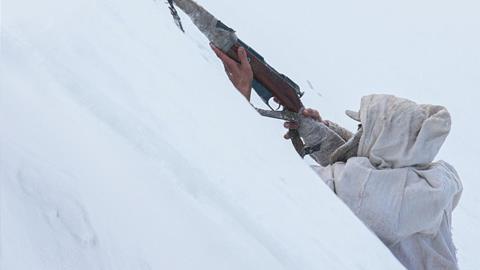Zhang Yimou joins hands with his daughter Mo with this efficient Lunar New Year sharpshooter drama

Dirs: Zhang Yimou, Zhang Mo. China. 2022. 96 mins
An addition to the swelling ranks of China’s recent war pictures, Snipers finds renowned Fifth Generation filmmaker Zhang Yimou sharing directorial duties with his daughter Zhang Mo to pay tribute to the ’Cold Gun Movement’ which saw Chinese sharpshooters helping North Korea resist US aggression during the Korean War (1950-1953). Zhang senior has been especially productive of late with an impressively varied run of films – Shadow (2018), One Second (2020), Cliff Walkers (2021) – that have catered to the tastes of both domestic and international audiences, but Snipers has the local market fixed in its crosshairs. Relatively contained and short on visual flourishes, it wears its patriotic heart on its blood-splattered sleeve while delivering bursts of action with brisk proficiency.
Snipers is never going to jostle for a place in a Zhang Yimou retrospective, but its pared-down approach is welcome amid China’s current cycle of bombastic wartime blockbusters.
Surprisingly, given his status, this is the first Zhang film to be released during the Lunar New Year period. Within a typically crowded frame, Snipers is at once a direct competitor and alternative to The Battle at Lake Changjin II; both depict the Korean war, but while Tsui Hark’s much-vaunted sequel is a 149-minute pyrotechnic extravaganza, the Zhangs’ collaboration clocks in at a trim 96-minutes and takes a largely grounded approach to combat recreation. This differentiation should enable Snipers to stealthily gain traction once the box office fireworks of its ostensible rival begin to fade. Internationally, Snipers probably won’t receive the prestige treatment that is usually bestowed on Zhang’s productions, but will have no trouble getting picked up for streaming release.
In the winter of 1952, a squad led by expert marksman Liu Wenwu (Zhang Yu) is tasked with rescuing intelligence officer Liang Liang (Liu Yitie), who has been ambushed by American troops. They find their comrade in the middle of the freezing battlefield where he has seemingly been left for dead, only to realise that his body has been placed there as bait. Having accumulated many kills, Liu has been dubbed ’The Grim Reaper’ in press reports and incensed American commander Jack (Jonathan Kos-Read) is determined to capture him.
A fierce battle of wits ensues, with the hemmed-in Chinese soldiers outmanned, outgunned, and lacking the field equipment of their enemy – the squad only has one pair of binoculars. Nonetheless, they put up a strong fight under Liu’s indefatigable guidance, although great sacrifice will inevitably be needed if they are to retrieve Liang before he takes his last breath.
The set-up is rather rote compared to the elegantly handled exposition of Cliff Walkers, with newsreel footage narrated by Liu’s protégé Dayong (Cheng Yongsheng) and flat character introductions that have the perfunctory feel of China’s copious television war dramas rather than a big-screen attraction. Yet the film finds its footing once the mission gets underway. Zhang demonstrated a knack for this type of action in the otherwise laboured The Flowers Of War (2011) which featured a side story of a Chinese sharpshooter picking off Japanese troops during the 1937 Battle of Nanking. Here, the streamlined narrative facilitates a series of well-executed set pieces that fuse cinematographer Zhao Xiaoding’s emphasis on the spatial geography of the desolate location with whizzing bullet effects that date back to Sniper (1993) but are still effective when the strategic build-up is suitably paced. The climactic man vs. tank battle threatens to stray into implausible Wolf Warrior 2 (2017) territory, but this sequence also largely eschews spectacle in favour of tactical smarts.
If the basics of the mission imply a Chinese version of Saving Private Ryan, the reason for reaching the intelligence officer is revealed to have wider significance than a family reunion, thereby contrasting collectivist spirit with the personal vendetta on the American side. Chen Yu’s screenplay is rather on the nose in this respect, not to mention its juxtaposition of thrifty ingenuity and heavily equipped brute force. It also doesn’t help that the foreign cast is comprised of jobbing international actors in the Chinese industry, entailing some one-note line readings and unintentional comical gruffness. Still, stereotyping is undercut by the depitction of Jack’s subordinates as tired soldiers who yearn for home and even profess grudging admiration for the courage of their adversaries. This leaves anti-American sentiment to be stoked by Jack, furiously portrayed by Kos-Read as an overzealous, self-mythologising ‘bad apple’ who is ripe for a crowd-pleasing takedown.
The actors comprising the Chinese squad acquit themselves sincerely, while there are some truly human moments between Liang and the North Korean boy (Zhao Hucheng) who fearlessly aids the fallen officer because he has become accustomed to the sound of the gunfire. However, efforts to stir national pride by having Liu repeatedly boost the morale of teary-eyed recruits slackens an otherwise taut narrative. Snipers is never going to jostle for a place in a Zhang Yimou retrospective, but its pared-down approach is welcome amid China’s current cycle of bombastic wartime blockbusters.
Production company: Beijing Enlight Pictures
Producers: Pang Liwei, Cao Xiaobei
Screenplay: Chen Yu
Editing: Li Yongyi
Cinematography: Zhao Xiaoding
Music: Dong Dongdong
Main cast: Zhang Yu, Cheng Yongsheng, Liu Yitie, Wang Ziyi, Huang Yan, Jonathan Kos-Read, Nathaniel Boyd, Scotty Bob Cox, Zhao Hucheng
























